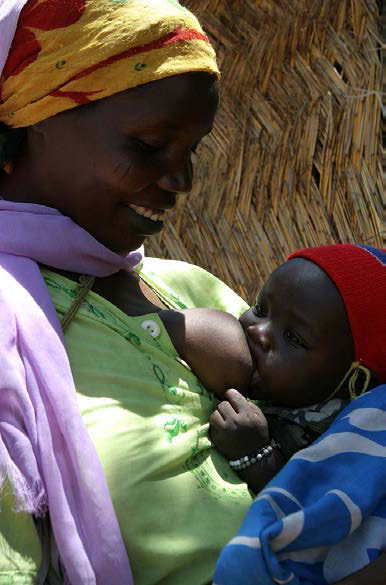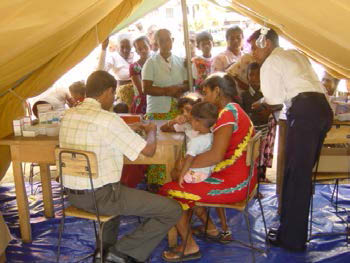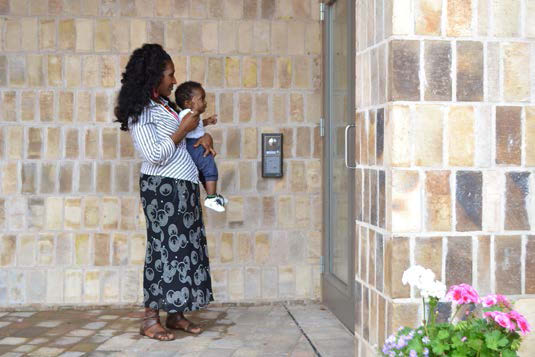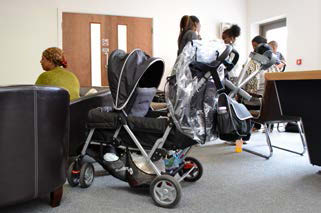Child health
 A child is a child first; immigration status is of secondary consideration. However, the fact that he or she is in a country not his or her own makes a profound difference to life and life experiences. The lives of migrant children, both in their country of origin and in the UK, are very different from the lives of children born and growing up in the UK.
A child is a child first; immigration status is of secondary consideration. However, the fact that he or she is in a country not his or her own makes a profound difference to life and life experiences. The lives of migrant children, both in their country of origin and in the UK, are very different from the lives of children born and growing up in the UK.
You are recommended to read the ‘Safeguarding’ section of this toolkit. Safeguarding is far more than child protection, and you will find a great deal of useful advice about child health, wellbeing and development issues related to migration
Working with migrant children
Consider the background. The child may have been involved in, or witnessed, extreme events. Children are forcefully recruited to serve as soldiers in many wars, and may have witnessed, been involved in or taken part in atrocities. These experiences may manifest themselves in psychological distress and behaviour disturbances.
- Trust may be an issue. For many of these children the world has been a hostile place, and health care professionals do not have an automatic place among the few adults who can be trusted. Take time and don’t expect to do too much in one session.
- Explain yourself. Many roles of nurses in the NHS are unique to the UK, and health care systems differ throughout the world. Explain your role from first base.
The effect of migration on children
|
The loss of childhood |
Children are adaptable, and generally learn a new language more quickly than their parents. This can lead to the child being used as the family’s mediator with the alien world outside the home, possibly in a caring role with their parents. This disrupts family dynamics and places inappropriate responsibilities on young shoulders. In many non-Western cultures obedience to, and respect for, parents is a given, and the need to rely on a child is a further indignity for parents who have lost so much. Children may show behaviours such as anxiety, nightmares, withdrawal or hyperactivity; however, few need psychiatric help. School is a normalising experience and can be extremely therapeutic, though bullying may be an issue. The routine of daily attendance, and the socialisation which takes place school, cam help children to adapt to the new country more easily than their parent/s. |
|
Experience of trauma |
Children and young people are not immune to the abuse associated with war, oppression and forced migration – some may have witnessed or been forced to take part in brutal acts - many may have lost friends or relatives. The abuse of women and children in refugee camps or IDP camps is widespread, common and well documented. Think carefully about how you work with people from camps. The UK Asylum system regularly detains children in prison like conditions – this can be disturbing and traumatising for children. Additionally, frequent home moves as their parents seek asylum can be destabilising to friendships, education and social networks vital for normalising a child’s experience of migration. |
Parenting issues
Approaches to parenting are cultural and historical – UK approaches are not universal and vary greatly from other cultures.
There are a range of particular issues which can impact the migrant child and family.
Absent/emotionally unavailable parents
Due to their own distress, the parent who is with the child/children may be less emotionally available than they would normally be. Parents who are economic migrants may be working very long hours.
Different parenting styles
Parenting styles in other cultures may be different from the norm in the UK. Parents may be stricter, children may be expected to be seen and not heard.
Families from cultures in which the parenting role is shared by the whole village may be overwhelmed by the demands of parenting on their own in a nuclear family, without the support of the extended family and community. They may, for example, leave the children on their own while they go to the shops, not realising that this is not regarded as acceptable in the UK. Such issues may have implications for child protection.
Parenting styles also differ with regard to playing with children and the amount of physical contact, including hugging, which is considered appropriate.
Informal adoptions
Children being cared for by adults who are not relatives, is not uncommon. The understanding of ‘aunt’ or ‘uncle’ may be broader than the UK blood relationship, and encompass all well-known adults within a community.
In conflict situations families may become split up, direct relatives killed and friends or neighbours assume the role of parent. However, there may be more sinister reasons for this situation, such as domestic bondage or child trafficking.
Unaccompanied children
The Home Office defines an unaccompanied child as:
“a person who, at the time of making the asylum application, is under 18 years of age or who, in the absence of documentary evidence, appears to be under that age, and who is applying for asylum in his/her own right and is without adult family member(s) or guardian(s) to turn to in this country.”
This definition excludes children who are cared for by a distant relative, or a sibling who is also little over the age of 18.
Unaccompanied children seeking asylum are not supported in the same way as adult asylum applicants. Under the Children Act 1989, support for unaccompanied children is the responsibility of local authority social services departments, regardless of the child’s immigration status.
UKVI may contest the age of the young person, and request an age assessment. This is a very imprecise science, and is usually the responsibility of Social Services Departments.
The extreme events which have led to a young person becoming an unaccompanied child leaves the child very isolated and vulnerable, and possibly at risk of mental health problems. Also see the Safeguarding Section.
Immunisations
 Immunisation schedules may have been disrupted due to migration.
Immunisation schedules may have been disrupted due to migration.
Immunisation schedules vary throughout the world.
The World Health Organisation has details of immunisation schedules throughout the world, including uptake rates.
The health care infrastructure in the country of origin may be minimal due to poverty or war. A general rule of thumb is that if a conflict is sudden and unexpected, the child will probably have received the immunisations due under the schedule of the country of origin.
If the conflict is chronic and on-going, immunisations may have been given sporadically, or not at all. Bear in mind the fact that immunisations given in refugee camps may not have been routine childhood immunisations.
For general information on vaccines and vaccination procedures, for vaccine preventable infectious diseases in the UK, see The Green Book.
Reflective learning
The discussion points below focus on some of the key points in the section above.
Discussion Point A
A 10 month-old baby girl, Genet, has been brought to the clinic by her mother. She comes from Eritrea, a country about which you know little. You ask about immunisations, and mother is unsure of what Genet has been given in the past.
Do you:
-
Ask Genet’s mother to find out more details and return to the clinic?
-
Start the immunisation schedule from scratch?
-
Tell Genet’s mother that you are unsure of what immunisations are required, and ask her to come back next week (through an interpreter, of course!), and do some research to inform yourself about how to proceed?
Discussion Point A
- Eritrea is a country at war, and therefore Genet and her mother are likely to have fled without any documentation about immunisations. They may also have been in a refugee camp in Africa, where any immunisations given may not have been the standard childhood immunisations. Genet’s mother is unlikely to be able to provide any firm information.
- This is a possibility, and may in fact be the right thing to do, but further research would be sensible.
- Information on immunisation schedules, and uptake, are available from the World Health Organisation, and also The Green Book. Generally speaking, if the reason for flight was sudden and unexpected the child will have received immunisation in line with the country schedule; if the conflict was long and on-going, the health infrastructure will be disrupted or non-existent and immunisations may not have been given.
Discussion Point B
Children generally pick up English more easily than their parents. It can be tempting to interact with the family through the child.
Why is this not advisable?
Discussion Point B
- Loss of childhood and the disruption of family dynamics. If the child is the family’s main mediator with the world, how does this affect parenting and the child’s place in the family? Placing such responsibility on the child is inappropriate.
- How much does the child really understand, and how accurate is the interpreting? Both in terms of actually understanding English, and understanding the adult concepts behind the words.
- What about confidentiality and how much can, and should, a parent disclose about issues which are worrying them in front of their child?
These are just a few of the reasons for not using a child for anything more complicated than ‘Tell mummy that I will come and see her on Tuesday and bring someone who can speak your language’. No doubt you can add to these reasons.
Women’s health
Introduction
Forced migration can be particularly hard on women. They are vulnerable to physical assault, sexual harassment and rape at all three stages of migration. In the host country they may become heads of households, with new roles and responsibilities.
Women may take on additional responsibilities within communities; while this may be demanding, it can also increase their self-esteem and provide meaningful activity.
Rape and sexual violence
Rape, (affects men as well as women) is frequently used as a weapon of war and ethnic cleansing, and as a method of torture.
- Often rape is used in wars to destroy ethnic purity or group identity, or to humiliate and degrade. Rape can also occur during a person’s escape from their country of origin.
- Women may have been trafficked into prostitution (see ECPAT). Sexual favours may have been demanded in return for food, water and safe passage.
- Many, possibly most, women who have escaped from war zones will have been raped, and testing for STIs is advisable. Raising the subject by asking questions such as ‘Many women in your situation have been raped or sexually abused, and I wonder whether this has happened to you?’ may make it easier for her to disclose.
- In some cultures rape is viewed as extreme dishonour, and a woman who has been raped will be an outcast, rejected by her family and community. She may have told no-one, not even her partner, what happened to her.
- Anyone who has been raped may feel that they have been physically scarred and permanently changed. She/he may experience pelvic pain for which no organic cause can be found.
If you are dealing with disclosure of rape, it is vital that you consider your own mental health and wellbeing and seek support for yourself, maybe from your line manager.
The Poppy Project works with women who have been trafficked into prostitution, and will advise about the best way forward.
Sexual health: sexually transmitted infections
Sexually transmitted infection (STI) is always a sensitive subject and difficult to talk about, and questioning should be gentle and take into account cultural attitudes.
- The risk of transmission of STIs is much higher when violence is involved.
- Rates of STIs are always higher in areas of lawlessness and chaos, and should be considered when discussing health with new arrivals from such countries.
Female Genital Mutilation (FGM)
‘FGM comprises all procedures that involve partial or total removal of the female external genitalia and/or injury to the female genital organs for cultural or other non-therapeutic reasons’ (WHO 1995)
- FGM is practised in 30 countries in Africa and in a few countries in Asia and the Middle East; for example 98% of women and girls from Somalia will have had FGM.
- FGM can lead to short-term complications such as damage to surrounding tissue, infection, shock and haemorrhage. Longer-term complications can include difficulties with micturition, menstruation and with sexual relationships, recurrent pelvic infections and difficult childbirth leading to possible fistulae (WHO 1995)
Female genital mutilation is classified by WHO into four major types:
- Clitoridectomy: partial or total removal of the clitoris (a small, sensitive and erectile part of the female genitals) and, in very rare cases, only the prepuce (the fold of skin surrounding the clitoris).
- Excision: partial or total removal of the clitoris and the labia minora, with or without excision of the labia majora (the labia are "the lips" that surround the vagina).
- Infibulation: narrowing of the vaginal opening through the creation of a covering seal. The seal is formed by cutting and repositioning the inner, or outer, labia, with or without removal of the clitoris.
- Other: all other harmful procedures to the female genitalia for non-medical purposes, e.g. pricking, piercing, incising, scraping and cauterizing the genital area.
It is illegal for FGM to be performed in the UK, and also illegal to send a girl abroad for the purpose of FGM.
This is a child protection issue.
 Pregnancy
Pregnancy
The care of the health of a pregnant woman and her baby varies enormously throughout the world, from high-tech interventionist techniques to untrained midwives. It follows that a woman who has previously given birth in, for example, Uganda, will not understand the very different system of care offered in the UK. She should be treated as though this was her first baby, and procedures such as pain relief explained clearly and simply.
- Maternal mortality rates in the UK are higher among refugee and asylum seeking women.
- Women new to the UK may not understand the importance, or the system, of early ante-natal booking.
- Bear in mind that pregnancy may be as a result of rape if the woman is newly arrived from a war zone – a devastating situation which presents a woman with a terrible dilemma. Often she will have arrived in the UK with the pregnancy too far advanced for a termination to be carried out. The baby will be a permanent reminder of a violent act, and the father will be unknown and/or hated. This may interfere with bonding with the baby and affect the mother’s ability to care for her baby. She will need extra support.
Childbirth
Remember that pain and fear will interfere with understanding of English, and even a woman who appears reasonably fluent in English will need an interpreter during labour. Different cultures have different norms for the person who should be providing support during labour. In many cultures it will be a female relative, a trusted woman friend, or there may be a woman whose role in the community is specifically to accompany and support women during childbirth.
She may well be isolated and lonely, in stark contrast to the support of family and community which she would have expected at home.
Family planning
Family planning and well-woman services can be of huge importance to migrant women.
Some forms of contraception will not be culturally acceptable. You cannot be expected to know all the nuances of all cultures so, if in doubt, ask.
For some migrant women the choice about the use, or non-use, of contraception may be limited by the culture of her husband. Discussions about choice may be restricted by the presence of a male relative or an interpreter from the local community. Although the usual issues of confidentiality and choice of interpreters apply, it might be useful in some circumstances to use telephone interpreting.
Family matters
Introduction
Working with refugee and migrant families can be very rewarding, and the support offered by health visitors, school nurses and midwives very much appreciated.
"The care I had from my midwife and health visitor was great. I wish that you could go to Kurdistan and tell the health authorities there that this is how to treat a pregnant woman and her baby!"
Iraqi Kurdish woman. She had given birth in Kurdistan and in the UK.
 Working with refugee families
Working with refugee families
Expect the unexpected. Families may disappear suddenly, having been:
- moved at short notice by the Home Office
- given a positive decision and moved to a homeless family unit
- received a negative decision and been deported or detained
For information on the movements of asylum seeking families contact the family’s case owner at UKVI.
Economic migrants may return to their homeland, either because they have lost their job, the contract has ended, or they have decided to return home, and students may have finished their course of learning.
Explain yourself
Taking time to explain your role and what you can offer will give the family a chance to get to know you and begin to develop the trust which is the essential precursor for any useful working relationship. Time well spent!
- The roles of health visitors and school health advisers are not universal
- The training and role of midwives in the developing world is very different from in the UK. Traditional birth attendants may have received only minimal training
- You will have to explain yourself from first base. Jargon such as ‘monitoring development’ will not translate, and will lead to bafflement
- Don’t assume any knowledge of the UK health care system
Maternal isolation
Women may be confined to home by child care and/or paternalistic cultural norms which do not allow women to go out unaccompanied. It may be much more difficult for women with young children to attend classes to learn English, without which they will have great difficulty in communicating with wider society.
Post-natal depression (PND)
- It may be difficult to distinguish between the distress of exile and PND which requires addressing.
- A useful tool is the ‘How are you feeling?’ produced by the Community Practitioners’ and Health Visitors’ Association (CPHVA) in 2003. It is translated into 5 languages – Somali, Bengali, Urdu, Chinese and Arabic.
- There may be difficulties with using the Edinburgh Post Natal Depression Scale: questions may not be culturally appropriate, and may be very difficult to translate into a meaningful form.
- The CPHVA have published a booklet ‘Postnatal depression and maternal mental health in a multi-cultural society’.
Parenting
Remember, for refugee women or asylum seeking women one of the parents may be missing or dead, or the women you are working with may have lost a parent themselves.
- Due to their own distress, the parent who is with the child/children may be emotionally less available than they would normally be. This situation can also arise where there are two parents.
- Shared parenting. The presence of grandparents, aunts and the community is not possible in exile, and is a major loss.
- The nuclear family, with parents taking full and sole responsibility for their children, is unfamiliar to many cultures, and can lead to misunderstandings with services in the UK.
- With no responsible adults on whom they can rely, an isolated parent may leave their child/ren home alone, which can lead to allegations of neglect.
- Explanations may be needed of what is regarded in the UK as safe practice.
Domestic violence
Exile can be very hard for men, who lose their traditional role as ‘breadwinner’, and the resulting frustration may contribute to domestic violence.
- The extreme events experienced by individuals may play out in the home.
- Women seeking asylum are particularly vulnerable as their claim may be in their husband’s name as head of the family. The woman may fear the loss of her claim for asylum if she seeks help.
- A woman new to the country is not likely to have any knowledge or understanding of what support is available to her.
- It is essential that you speak to the woman alone, but this may be difficult to arrange. A situation could be engineered by inviting her to the clinic and requesting that the man leave the room during an ‘intimate examination’. It is particularly important in these situations to use a professional interpreter rather than allow the man to speak for the woman.
